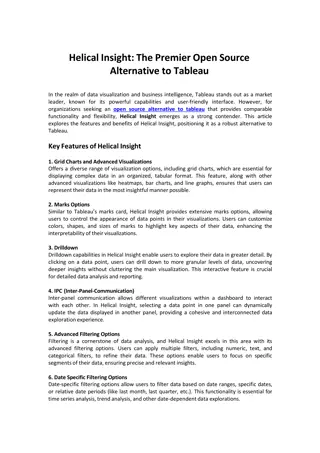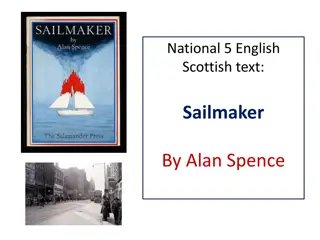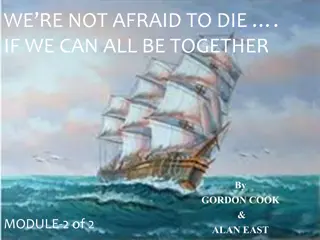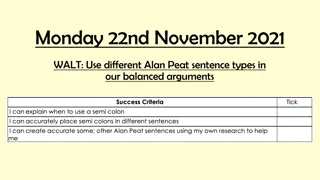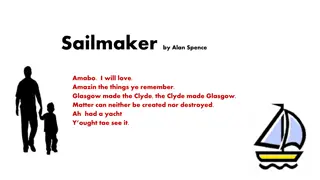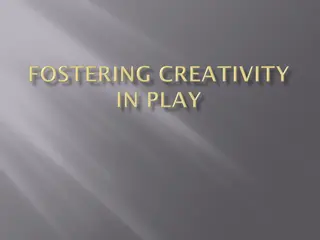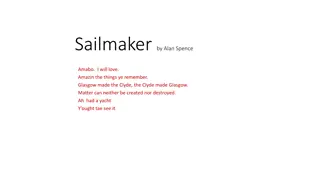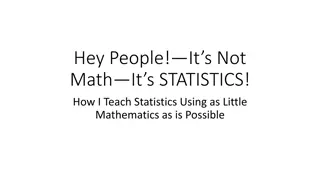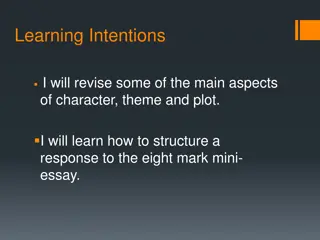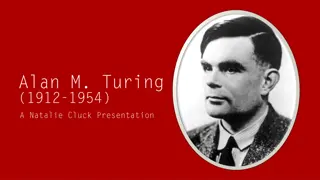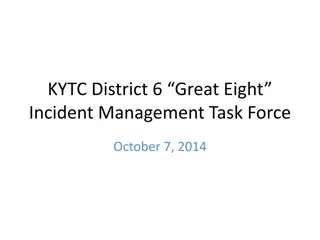Insight into the Autobiographical Play "Sailmaker" by Alan Spence
Alan Spence's play "Sailmaker" delves into the poignant narrative of loss, familial struggles, and societal perceptions. Set in a staunchly Protestant culture of Glasgow, the play weaves a tale of Davie, a sail-maker, and his son Alec as they grapple with grief, adaptation, and personal transformations. The characters' attempts to escape their circumstances underscore themes of generational change, acceptance, and the inevitability of obsolescence, beautifully depicted through symbolisms like the model yacht. Spence's deeply personal connection to the story shines through, offering a reflective exploration of human emotions and connections.
Download Presentation

Please find below an Image/Link to download the presentation.
The content on the website is provided AS IS for your information and personal use only. It may not be sold, licensed, or shared on other websites without obtaining consent from the author.If you encounter any issues during the download, it is possible that the publisher has removed the file from their server.
You are allowed to download the files provided on this website for personal or commercial use, subject to the condition that they are used lawfully. All files are the property of their respective owners.
The content on the website is provided AS IS for your information and personal use only. It may not be sold, licensed, or shared on other websites without obtaining consent from the author.
E N D
Presentation Transcript
Sailmaker Revision Notes
Alan Spence He was brought up in Glasgow in a staunchly protestant culture. Sailmaker reflects this experience. Spence s mother died when he was eleven years old and his father struggled to successfully navigate them through the subsequent years of their lives, both financially and emotionally. Sailmaker is a largely autobiographical play.
The Title The title Sailmaker refers to Davie s trade. For millennia, sailmakers had been fundamental contributors to the story of human endeavour, trade and civilization. The industrialisation of shipping during the 19thand early 20th centuries made sails unnecessary. The obsolescence of sailmakers in general is an echo of the obsolescence of Davie (Alec s father) in the play. A sense of departure and loss is imparted to some extent through this.
Characters Alec Alan Spence, basically: he experiences the loss of his mother at an early age, an increasing awareness of the flaws of his father and separation from his roots (personally, socially, intellectually). Davie Alec s father: he is incapable of adapting to change and loss; he is a sail-maker (and therefore is highly skilled) to trade and is self-educated to a certain extent (has read Dickens ); he does not meet his responsibilities effectively and is a procrastinator (symbolised by the model yacht for which he never does make sails). Billy Davie s brother: he is a Big Orange head-banger according to Davie. He emanates casual bigotry. Yet, he does get things done, and can adapt to change. The fact he moves to Aberdeen and that his son becomes an Aberdeen supporter would suggest either that the prejudice he espouses will disintegrate through generational, economic and cultural change or that it will continue in a different form. Ian Billy s son: a simpler, less intellectual lad than Alec, he sees a chib where Alec sees a marlinspike ; he associates the intellect and higher social status with a negative perception of homosexuality. He will follow in his father s trade painting and will move away from Glasgow.
The Yacht The yacht: symbolises Davie s failure: both to deliver on his promises and inability to act in a practical, responsible way. Billy does his bit he paints the yacht proving that he has some wherewithal. The burning of the yacht at the end of the book symbolises Alec and Davie s acceptance that Davie will not change. Each has given up on him. The symbol of the model yacht is introduced near the beginning of the play, and Davie s pun Ah had a yacht. Y ought to see it. is introduced. There is irony in Davie associating the homophones yacht (the model ship) and y ought (moral responsibility) given that he does not keep his word to mend the model (an object which may later be interpreted as a symbol for Alec s grief / loss). Ian s words Put it in the canal. Ye can all see it. are repeated by Davie at the end of the play and their significance is emphasised.
Hope/Dreams/Escape Each character attempts to escape their circumstances throughout the play. Davie is unhappy at work and grieving for his wife so he drinks ( Just a wee hauf when ah finish ma work. An by Christ ah need it. ) and gambles ( Ah suppose it s the feelin you ve at least got a chance. ) He is a dreamer and never manages to escape, instead sinking gradually lower and lower in life. As a small boy Alec escapes into games and imaginary worlds, often with Ian. They pretend to be Indians, pirates, footballers etc and love comics. As he gets older, he uses education as an escape, first as a member of various church groups (he wins prizes for Bible study), then at school where he does so well he makes it out of Govan and away to university and a wee bedsit or something . The shell is an important symbol of escape as it allows them to hear faraway places. Billy and Ian decide to leave Glasgow, eventually to Aberdeen but having considered Corby (Billy) and the army (Ian). Their simpler, more practical approach to life is at least as successful as the attempts made by Davie and Alec.
Class and Poverty The characters are all solidly working class. Ian and Billy do not overthink this, aiming to get well-paid secure jobs and live as well as they can ( Ah got a letter fae Alec. He s still at school. Can ye imagine! ). Billy is reliable (he is able to lend Davie money when he needs it and sorts out the bookmaker) and well organised and seems content. They love football but have fairly dubious views on religion. Alec and Davie struggle due to Davie s fecklessness (gambling and drink) and his difficulty holding down a job. The obsolescence of sailmaking as a trade and his struggles to adapt reflect not just his decline but the decline of industrial Glasgow and the working class as a whole as jobs and opportunities dry up and people lose security and income. Davie ends up in debt and they live in a run-down flat in a bad area (at the end of the play they have to burn their possessions to keep warm). Money is always tight and a source of arguments.
Grief and Loss The play begins with the death of Alec s mother. Alec hears it from Davie who tells him he has a bit of bad news for you . This is an inadequate way of telling Alec and sums up how inadequate Davie is generally in dealing with his wife s death and in providing properly for his son (he describes himself as shattered which could have two meanings). He soon turns to drink and gambling and gets into debt. He is unable to cook properly and the house is a mess. He confides to Billy how difficult he finds life without his wife. Alec reflects on his loss in standard English (not Scots) which tells us he is looking back on it as an educated adult. It is the defining moment in his life. Spence has him repeat key phrases ( My mother was dead ; Yer Mammy s dead etc) as he struggles to come to terms with his loss. Alec describes how nothing has changed yet everything has ie the world is going on as normal but his life is irrevocably damaged. The boy playing the same two notes on the mouth organ gives a feeling of the relentless depression both Davie and Alec feel.





